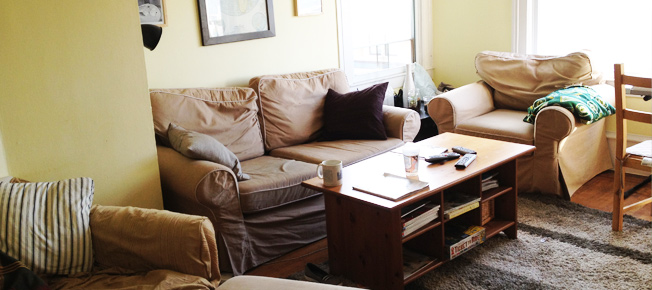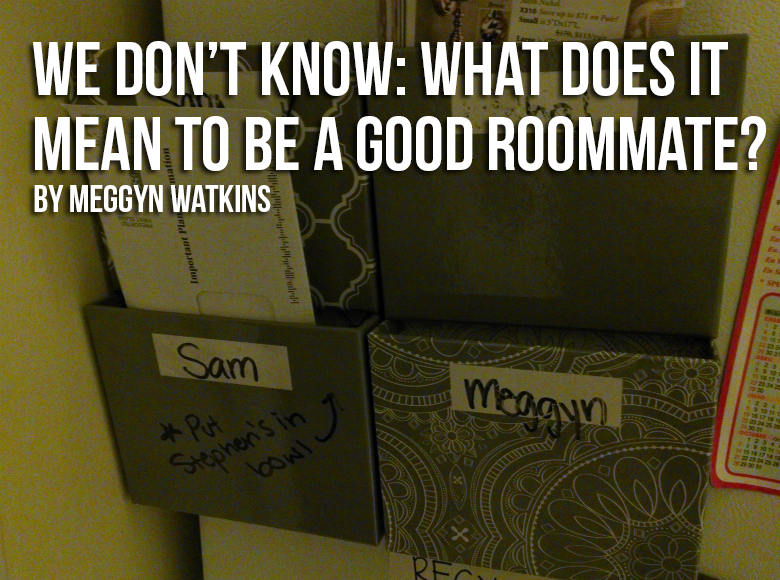My roommate and I are what you might call: roommate soulmates. We compliment each other perfectly in the fine art of living with someone and not wanting to kill each other. And yes, we met through Craigslist.
To be honest, I love using Craigslist to find roommates. I think it’s usually easier to live with people that you don’t already have a connection with. At first, living with a friend seems like a great idea: you know the other person isn’t crazy, they’re generally neat, you guys have the same interests and hang out on weekends anyways. But, being goods friends does not necessarily make you good roommates.
Remember when Chandler kisses Joey’s girlfriend in Friends and Joey makes Chandler sit in a box to prove his friendship? Yeah—well you’re going to wish you could put someone in a box just because they haven’t done their dishes for a few days. But since you’re friends, and not just roommates, you probably won’t because you could damage the friendship. Yay passive aggression.
It’s also important to remember there is also that point at which friends spend TOO much time together. Everyone needs their space. I’m not saying living with someone you already know is an absolute no-no… but you have been warned.
So, if you’ve officially decided its time to involve Craigslist in your quest for your ideal roomies you’ve come to the right place. I’ve been on both sides of this battle. I’ve been the one looking for a room and I’ve been the one deciding which lucky soul gets a room. I live in San Francisco so finding housing is rough. Having done this 3 or 4 times in the past year, I have some tips for everyone involved to make the process a bit smoother.
If you’re looking for a room:
- Prep for the perfect response.
When you start responding to emails craft 4–5 sentences mentioning your age, job situation, smoker/non-smoker, if you have friends/family in the area, if you have pets. Are you home a lot or always out of the house? Mention some of your interests and favorite tv shows—keep it lighthearted—comedies and wine usually go over well.
If there is a definite start date that you need to be into an apartment—be sure you mention it. If that date just doesn’t work, you’re wasting everyone’s time.
Add all ways to contact you upfront (phone, email, skype, owl…)—seems obvious but sadly it’s not.
This is your base email. Use this as a starting point when you respond to posts. And when you do respond to a post, paste the URL of the original post at the bottom of the email for your own use. When the post owner responds, you will have the link so you can re-read which post was theirs. If you don’t do this you will only see the email that you sent them (which is likely to look very similar to the 15 others you sent out today…)
It’s rough out there. At least where I live. And when we were looking for a roomie a few months ago I can tell you, the more flexible and available you were, the more likely you were to get the room. If you know you’re looking for an apartment this week—clear your schedule beforehand. You want to be able to respond immediately and say, “Yes, I can meet up tonight!” And then when they say, “Oh shoot—actually can you do tomorrow?” You say, “Yes! That’s no problem. When should I come by?” You are understanding and open to changes—as any good roomie should be.
Which also applies to move in dates. Even though we said the room is available on the 1st…. roomie A has to move stuff out while roomie B moves his/her stuff into roomie A’s room… while you move your stuff into roomie B’s room. The point is, if you have any flexibility on move in dates, mention it either in the initial email, a follow up email, or when you meet.
- Treat the process like a job interview.
When you go to see the apartment, act enthusiastic unless you absolutely despise the place. You may find it is your best option later on and find yourself wishing you hadn’t cringed at the small closet.
Once you’ve seen the apartment and met the roomies, if your conclusion is that you want the apartment—tell them in person that if they offer it, you will take it. You don’t want to make them feel pressured—simply offer up the information that they may already be wondering. I am more likely to offer a room to someone if I already know they want it.
Follow up. Seriously guys. It says a lot to simply send an email after seeing the apartment thanking them for their time and saying or repeating that you would take the room if they offered it to you.
If you’re looking for a roomie:
Include photos of the apartment. I’m just going to let this statement stand on it’s own for a while because it’s that important. People like photos. People want to respond to posts with photos. Take good ones where the rooms are tidy and the closet has more hanging in it than sad coathangers. Include photos of the room itself as well as some of the common areas. The more, the better.
Write about each individual roomie (1-2 sentences per person) and the general atmosphere of the apartment. Are you all already friends? Did you all meet on Craigslist? Do you have Wine Wednesdays?! Can I join!!?
Ask for a Facebook/LinkedIn/Twitter link. You first gut about a person is often right—in this case, online stalking is good. Also, you don’t need their explicit permission to do a little googling.
Make any absolutes/strong preferences clear. If you can’t have pets in the apartment—say it. If you would really prefer that someone move in the 5th even though the room is technically open the 1st—say it. If you don’t, you will get lots of emails from cat lovers who need to move in by the 1st.
Create a separate email account (or use an old account) which makes it much easier to navigate your responses. It’s also incredibly helpful if you have multiple people who are looking at and replying to the responses.
Once you’ve responded to some potential roomies and they’re on their way to meet you, clean the apartment—but not too much. Make the place presentable, but not drastically cleaner or more organized than usual. Maybe they’re a slob too, the fact that your place is now spotless will make them think they won’t fit in.
- Nothing is final until a lease is signed.
I learned this the hard way last time. Girl was super interested, we told her she had the place, she was psyched, she ended up backing out because she had crazy overbearing parents who freaked out because we (two 24 year old adults) had lots of booze on top of our fridge. True story. Unless a lease or sublease is signed, try to keep your 2nd and 3rd choices as options. I think the best thing to do is to tell the runners up that you offered the place to someone BUT he/she hasn’t responded yet and they’re next on the list!!
If this is a sublease situation, be sure you actually have something down in writing. It’s easy to alter a basic sublease agreement for your needs. Just use simple writing and make sure you read everything through. Print out a copy for every person and have everyone sign all the copies.
Now, I’m not going to guarantee that taking these steps will lead you to your one and only roommate soulmate. It’s hard to tell whether someone is a great fit until you’ve actually lived with them. But, they will certainly make the process easier and get you more offers, if you need a room, or more quality people, if you need a roomie. Good luck out there on your own Craigslist quest.

Photo by Sara Hamling





